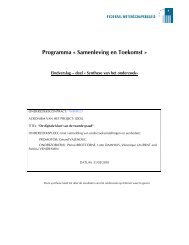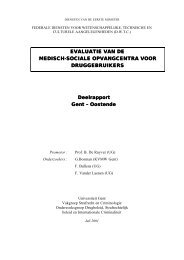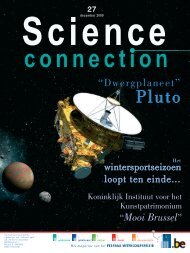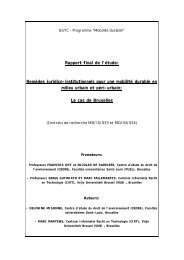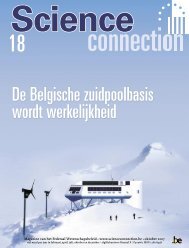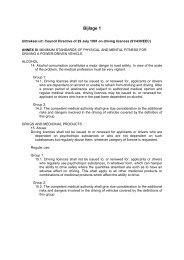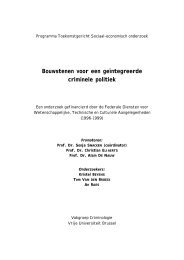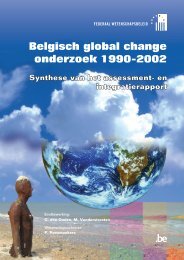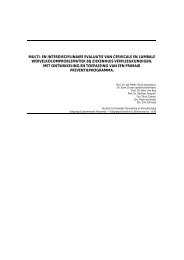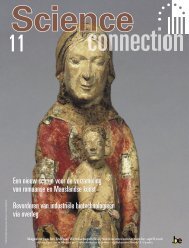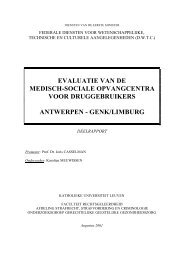chapter 3 inventory of local food systems
chapter 3 inventory of local food systems
chapter 3 inventory of local food systems
Create successful ePaper yourself
Turn your PDF publications into a flip-book with our unique Google optimized e-Paper software.
Project CP/59 - “Instruments and institutions to develop <strong>local</strong> <strong>food</strong> <strong>systems</strong>”<br />
there are always persons who accept a certain responsibility and dislike to harm the trust<br />
placed upon them by the rest <strong>of</strong> the group. This trust is an important aspect <strong>of</strong> the social<br />
capital built within LFS.<br />
At micro-level, social capital is defined as the possibility <strong>of</strong> an individual to mobilise<br />
resources from the social networks (s)he belongs to (Komter et al., 2000). In analogy,<br />
Meadows et al. (1972) define social capital as a stock <strong>of</strong> characteristics (knowledge,<br />
trust, efficiency, honesty,…) that do not belong to the individual alone but to the human<br />
collective. Bourdieu (1992) mentions that this social capital comes forth from a more or<br />
less institutionalised network <strong>of</strong> relations <strong>of</strong> mutual trust and gratitude, which <strong>of</strong>fers the<br />
backup <strong>of</strong> collective capital property to each one <strong>of</strong> its members. Social capital allows<br />
for an individual effort towards the collective. Knowledge sharing is a means to build<br />
social capital (Carayannis et al., 2000). Finally, Bourdieu mentions that social capital is<br />
also closely linked to cultural capital (such as knowledge, degrees,…). Also, social<br />
obligations (relations) can under certain conditions be exchanged to become economic<br />
capital. Cultural capital in its turn can facilitate the access to certain networks, while<br />
certain social networks can also lead to the accumulation <strong>of</strong> new knowledge and skills.<br />
Within the development <strong>of</strong> social capital theories, two schools can be distinguished.<br />
The first one sees social capital as a community resource which groups or societies can<br />
recur to for collective action. The second one views social capital as a production means<br />
fed by the social relations in a community or group, which the members <strong>of</strong> a society or<br />
group can own (Dessein et al., 2004). Both interpretations are important when looking<br />
at the social sustainability <strong>of</strong> networks. Indeed, the importance for the network as a<br />
whole as well as for the different individuals can thus be taken into account.<br />
1.2.1.3. Ethical and sustainable consumption, incl. support for the <strong>local</strong> economy<br />
Within <strong>local</strong> <strong>food</strong> <strong>systems</strong>, the producers see selling rather as building a long term<br />
relationship with the client. Selling then becomes a beneficial exchange for both<br />
producer and client. In <strong>local</strong> <strong>systems</strong>, the client for example buys his/her organic<br />
products not in the first place because <strong>of</strong> the procedures followed, but because <strong>of</strong> the<br />
trust placed upon the persons who grow the products.<br />
The shift from “Gemeinschaft” (community) to “Gesellschaft” (company/ society) is<br />
parallel to the current modernisation process in which persons become alienated from<br />
their own <strong>local</strong> environment and start leading a more individual, more rational life. This<br />
is mainly so for social relations, but also for the relationship <strong>of</strong> the human beings with<br />
eco<strong>systems</strong> and nature. The tendency to maximize economic benefits becomes<br />
dominant over the social and ecological benefits (Borgström Hansson and Wackernagel,<br />
1999). It is this tendency to which the evolution towards a more ethical and sustainable<br />
consumption wishes to react.<br />
Halweil (2002) considers that the most important loss caused by the globalisation <strong>of</strong><br />
markets is reflected by the fact that capital no longer circulates <strong>local</strong>ly. It can be argued<br />
that a <strong>local</strong> <strong>food</strong> system benefits in the first place the rich consumers <strong>of</strong> a community.<br />
This is when one thinks that mainly niche products will be marketed, products which<br />
are enjoyed by the more well-<strong>of</strong>f classes. However, poorer people also can enjoy the<br />
SPSD II - Part I - Sustainable production and consumption patterns - Agro-Food 11



